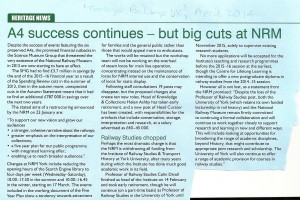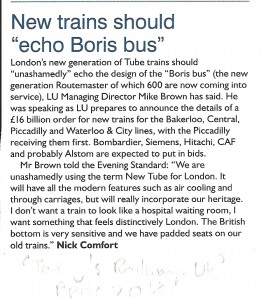From the South Wales Evening Post, 26 March 2014.
Brakes put on Swansea Bus Museum’s plans to move
 A South Wales Transport AEC Renown single decker bus turns into High Street from Alexandra Road in 1950.
A South Wales Transport AEC Renown single decker bus turns into High Street from Alexandra Road in 1950. Swansea Bus Museum was hoping to move its premises to Clarence Street, but the council is proposing to demolish the building.
Swansea Bus Museum was hoping to move its premises to Clarence Street, but the council is proposing to demolish the building. The old and the new in Oxford Street, mid-1950s. The buildings behind this United Welsh double decker bus represent post-war Swansea rising from the ashes of wartime bombardment.
The old and the new in Oxford Street, mid-1950s. The buildings behind this United Welsh double decker bus represent post-war Swansea rising from the ashes of wartime bombardment. A South Wales Transport AEC Renown single decker bus turns into High Street from Alexandra Road in 1950.
A South Wales Transport AEC Renown single decker bus turns into High Street from Alexandra Road in 1950. Swansea Bus Museum was hoping to move its premises to Clarence Street, but the council is proposing to demolish the building.
Swansea Bus Museum was hoping to move its premises to Clarence Street, but the council is proposing to demolish the building.
MEMBERS of Swansea’s historic bus museum say they are upset after being told they cannot relocate to a former bus garage in the city.
The Swansea Bus Museum said the unit they are currently leasing is costly and too big.
So they sent an email to Swansea Council asking to purchase![]() the old bus garage on Clarence Street, but this was rejected by the council.
the old bus garage on Clarence Street, but this was rejected by the council.
Alan West, chairman of the museum, said: “The old bus garage is of great historical value to us and we thought it would be the perfect place to move the museum to.
“At the moment the current unit we lease in the SA1 Business Park is costing us a lot in rent and rates.
“We only have three years left on the lease, so are looking for somewhere smaller and cheaper to move to.
“The place where we are now is far too big for us. So when we found the old bus garage we thought it would be perfect.”
However the museum group was told by Swansea Council that the building, close to the former Vetch football ground, is structurally unsafe and needs to be demolished. Mr West said: “That bus garage has been there since the 1950s and was custom made for United Bus Wales.
“It is a piece of heritage and we would be so upset if it was demolished. It was in use right up until last year when the electrics were condemned, but I think the building itself is sound.
“We are really interested in taking it on and think it would be a perfect place for the museum.
“The location is great and there is lots of parking nearby. As it is very near to the Quadrant I think it would be the perfect place because there would be plenty of footfall.”
A Swansea Council spokesman said: “We couldn’t agree for the Swansea Bus Museum to relocate to Clarence Street, because the building there is structurally unsafe and needs to be demolished.
“The plan is to put a temporary car park on site once the building has been demolished, pending redevelopment in the long term.”
Swansea Bus Museum is run by the South Wales Transport Preservation Trust and restores, preserves and displays buses from former public transport companies of South and West Wales.
At the museum there is currently a large fleet of buses including a 1959 Bridgemaster double decker.
The bus is one of only four surviving vehicles and the museum is looking to restore it so it looks back to its best in time for the 100 years celebration of South Wales Transport later this year.
South Wales Transport began shortly before the outbreak of the First World War and, at its height, it was responsible for 92 million passenger journeys a year. This year South Wales Transport is taking steps to celebrate the history of buses in order to mark its centenary.
Iconic bus companies from South Wales will be recalled in a new book, to be launched as part of the Roads and Road Transport Associations’s event Wales on Wheels, at the National Waterfront Museum, Swansea, on Saturday, May 17.
The weekend of events will mark Swansea Bus Museum’s centenary year, and Return Ticket — the Story of South Wales Transport, by former Evening Post News Editor Jonathan Isaacs, will detail the troubles and triumphs of ‘The Transport’, as it was affectionately known.



